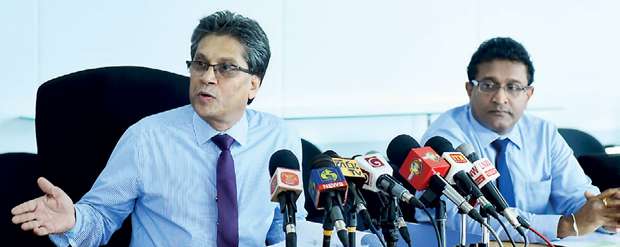06 Oct 2018 - {{hitsCtrl.values.hits}}

From left: Technical Adviser to the Minister of Development Strategies & International Trade Mangala Yapa and BOI Director General Duminda Ariyasinghe.
Pic by Kithsiri de Mel
By Nishel Fernando
The Board of Investment (BOI) yesterday denied corruption allegations relating to the 488 million euro mega integrated high-speed train manufacturing plant project’s approval process, and said the investor is yet to file a business plan, including sources of finance, in order to confirm the project’s feasibility.
Addressing a media briefing yesterday, BOI Director General Duminda Ariyasinghe vehemently denied any wrongdoing from the side of the BOI and pointed out that the project was evaluated by the Cabinet appointed Single Window Investment Appraisal Committee (SWIAC), headed by Finance and Mass Media Ministry Secretary Dr. R.H.S Samaratunga.
The other members of SWIAC are: Economic Advisor to the President, Senior Advisor to the Prime Minister, Chairmen of the BOI, Sri Lanka Tourism Development Authority, Technical Advisor to the Development Strategies & International Trade Minister, BOI Director and Bluestone1 Chairman Ajit Gunewardene.
Several media reports stated that the investor of the project, Ceylon High-Speed Railway Corporation (Pvt) Ltd., in a letter had complained to the President that the approval of the project was delayed amid certain highly placed individuals demanding commissions.
However, joining the media briefing yesterday, Mangala Yapa, the Technical Advisor to the Minister of Development Strategies & International Trade, who is also a member of the SWIAC, denied allegations and said that the project was differed as the investor had failed to submit the required business proposal requested by the SWIAC.
He further elaborated that the integrated high-speed train manufacturing plant project is one of the five deferred projects related to the BOI.
“Once the information requested by the committee is provided, the project would be considered for approval,”
he stressed.
Yapa noted that the relevant application and project proposal was received by the BOI on March 13 last year, and it was reviewed by the Screening Committee at BOI on 14th of June last year and was referred to the SWIAC, given the envisaged broad scope of the project.
Yapa revealed that the investor had sought a large number of State concessions, while failing to provide any documentation to prove the sources of financing and technology partners.
According to him, the investor had requested from the government to provide 2, 242 acres of State land in 3 locations and 1, 823 acres of private land in 6 locations.
The investor had asked the BOI to declare the overall land area of 4, 065 acres in the nine locations as licensed zones under section 22 of the BOI law.
Moreover, the investor sought permission to operate a private bank to facilitate leasing, loans, finance, current accounts, letters of credit, bank guarantees etc.
The investor also sought permission to set-up a private university as a Public-Private Partnership (PPP) with State universalities and technical colleges.
Some of the other incentives requested by the investor include: 95 percent special income tax exemptions and all spare parts and fuels on a tax free basis; relaxation of import/export control procedures; granting approval to import 4 helicopters and other capital equipment free of custom duties and all charges, electricity power under special tariff etc.
The initial investment for the project was estimated at 488 million euros over a period of eight years while 2.2 billion euros had been indicated as working capital to be invested by the investors upon completion of the project.
The investor had notified the BOI that German-based GHH-Bonatrans and ZF Friedrichshafen and ITAL Certifier and Marchaglia Spa, Italy, had expressed their interest to enter into investment partnerships or as technology partnerships.
In addition, Ariyasinghe said that German conglomerate and one of the five companies considered in the world to posess technical capacity in high-speed train manufacturing, Siemens AG was also named as a potential partner by the investor.
However, he noted that the investor had so far failed to provide any documentation to the committee to show Siemens’ willingness to enter into a partnership, while only a copy of the Siemens annual report was submitted to the committee.
The Ceylon High-Speed Railway Corporation (Pvt) Ltd. in the project proposal had pledged to increase Sri Lanka’s export revenue by 5-7 billion euros in 7 years of the project’s implementation, amounting to 30 percent of Sri Lanka’s export.
However, Yapa noted that the investor sought greater government involvement in finding export markets, which includes entering into MOUs and other agreement with European countries.
The investor had officially communicated with the BOI on December 14 last year for the last time and had informed the BOI that they will submit the business plan in 2-3 weeks, according to Yapa.
The compressive business plan requested by the SWIAC includes cost breakdowns, projected cash flow, infrastructure requirement, marketing plan, exporting countries, technology partners, specific project implementation plans for the entire project, individual subsistence factories, final assembling plants and Jetty, detailed sources of financing etc.
Ceylon High-Speed Railway Corporation (Pvt) Ltd. was incorporated in Sri Lanka in 2015 with two local directors.
17 Nov 2024 14 minute ago
17 Nov 2024 31 minute ago
17 Nov 2024 3 hours ago
17 Nov 2024 4 hours ago
17 Nov 2024 4 hours ago